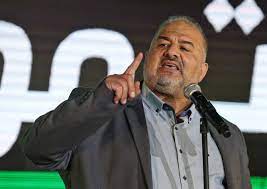Dr. Dania Koleilat Khatib
Mansour Abbas, the chairman of the United Arab List in the Israeli Knesset, who is referred to as a pragmatic Islamist, last week called for the various Palestinian factions to lay down their arms and join the political struggle. He said that what we are facing is a political problem that needs a political solution.
Abbas is totally right, in principle. The question is, if the Palestinians were to lay down their arms, would Israel accept giving the Palestinians their state? It is pertinent to point out that the Palestine Liberation Organization gave up armed struggle for the Oslo Accords in 1993. But did that further their cause in any meaningful way? Abbas did not spell out what this political struggle might look like. How can the political struggle exist when Palestinians have no political representation? The entire problem is that there are 5.35 million Palestinians in the West Bank and Gaza who are stateless – they do not have a country and do not have proper passports. Israel is refusing to give them nationality as part of a one-state solution because the country would lose its Jewish majority. At the same time, Israel does not want to give the Palestinians a state because this would mean giving up on “Judea and Samaria.”
This dilemma is driving a political stalemate and pushing every government to avoid tackling the issue in order not to face a backlash. Politicians saw what happened to Yitzhak Rabin when he tried to make a compromise in order to secure a peaceful settlement to the problem. No one wants to face the same fate. The main hurdle that prevents the finding of a settlement with the Palestinians is the medieval mentality that drives Israeli politics. The concept of the Israeli state is linked to the sacred, to some commandment by God. This type of mentality drove the Crusades as well as the Arab conquests. This was adequate 1,000 years ago but it is not today. Today, modern states are defined by international law, not by a biblical claim. The problem is the mentality whereby many Israelis view themselves as the chosen people, to whom God promised the land between the sea and the river. This mentality existed before the emergence of the Iranian threat and before the creation of Hezbollah or Hamas. Several statesmen have spelled it out, including Israeli Prime Minister Benjamin Netanyahu.
However, what Israel calls Judea and Samaria is the West Bank, which is an integral part of Palestine under international law. This ideology is preventing the Israeli leaders from making any concessions that would allow a two-state solution and peace. Instead, they resort to repressing the Palestinians and, as a result, they suffer a backlash every now and then. This will continue in perpetuity until this ideology is relinquished. Today, Israelis have to choose between ideology and security. Unfortunately, they have been under the impression that they can have both. They can coerce the Palestinians by maintaining the occupation, subjugating them day in, day out and facing no consequences because of American and Western complicity. We cannot blame the Israelis for adopting an ideology; everyone does so to differing degrees. Ideologies are broad ideas that influence our worldview. Even the most pragmatic people are influenced by ideology. They have it in the back of their mind even if they do not realize it. However, when people have to choose between ideology and survival, they choose survival – this is why people prioritize security over ideology.
Israel will not relinquish its ideology unless it has to; unless it feels it needs to make this choice. Israel needs to be coerced to make this choice because it always thinks it can suppress Palestinians and get away with it. Here, the US should give Israel tough love and compel it to choose between ideology and international acceptance. Hence, what Abbas said is valid only if the international community supports him – i.e., if the international community commits to pressuring Israel to accept the two-state solution. Nevertheless, Israel is a sovereign state. International pressure should be coupled with a change in public opinion. So, Abbas needs to work domestically. But how can he convince the Israeli ideologues? He needs to create a peace camp.
Abbas has already taken a step that earned him the respect of many Israelis: he reached out to the families of the hostages, which is something Netanyahu has been reluctant to do. Can Abbas now build on the momentum? Can he lead parts of Israeli society to engage in some introspection driven by the hostages’ ordeal? Can he push them to ask themselves the very basic question: Why did this happen? Why are they resorting to “terror” against us? Is occupation sustainable? Will occupation guarantee the security of our children? However, in this endeavor, Abbas definitely needs the protection and support of the international community, otherwise he will be subjected to many false allegations by the racist government of Netanyahu and its members in the Knesset. For Abbas to convince Palestinian factions to lay down their arms and lead a peaceful struggle, he needs to show them it works. Decades ago, the PLO took exactly the path Abbas suggested, giving up armed struggle in favor of political negotiations, only for it to backfire. The PLO could not fulfill the Palestinian dream of statehood. Palestinians are very skeptical; they have been fooled several times before. Therefore, the international community should put all its weight behind Abbas and help him create the conditions conducive to a two-state solution and Palestinian statehood.







